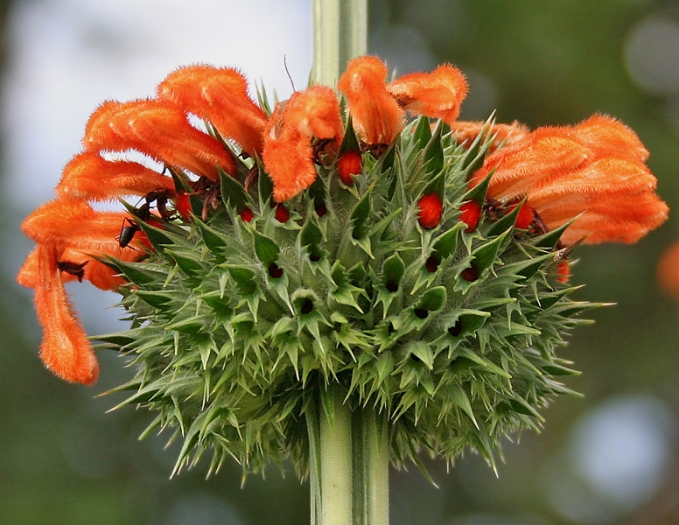Christmas Candlestick
(Leonotis nepetifolia)
Christmas Candlestick (Leonotis nepetifolia)
/
/

J.M.Garg
CC BY-SA 4.0
Image By:
J.M.Garg
Recorded By:
Copyright:
CC BY-SA 4.0
Copyright Notice:
Photo by: J.M.Garg | License Type: CC BY-SA 4.0 | License URL: https://creativecommons.org/licenses/by-sa/4.0 | Uploader: J.M.Garg | Publisher: Wikimedia Commons | Title: Leonotis_nepetifolia_(Deepmal)_in_Narshapur,_AP_W_IMG_1164.jpg | Notes: {{Information |Description ={{en|1=Hairy, new ''L. lanigerum'' buds}} |Source ={{own}} |Author =[[User:Lgvg|Lgvg]] |Date = |Permission = |other_versions = }} |

















































Estimated Native Range
Summary
Leonotis nepetifolia, commonly known as Christmas Candlestick, is an annual herb native to open woodlands, savannahs, and scrublands across Africa and South Asia. It can reach up to 3 meters (9 ft 10 in) in height and is characterized by its whorls of striking lipped flowers, which are most commonly orange but can also be found in shades of red, white, and purple. The flowering season extends from late summer to early winter, providing a long-lasting display of vibrant color. Its foliage consists of drooping dark green, very soft serrated leaves that can grow up to 10 centimeters (4 in) wide, adding to the plant’s ornamental value.
Christmas Candlestick is valued for its showy flowers and is often used in tropical and subtropical gardens for border planting or as a specimen. It thrives in full sun to part shade and prefers well-drained soils, though it is tolerant of a range of soil types. Regular watering is necessary, especially in dry conditions. While it is generally easy to maintain, it can be susceptible to aphids and spider mites. Gardeners should be cautious about its potential invasiveness; it can spread rapidly and outcompete native species in some regions.CC BY-SA 4.0
Christmas Candlestick is valued for its showy flowers and is often used in tropical and subtropical gardens for border planting or as a specimen. It thrives in full sun to part shade and prefers well-drained soils, though it is tolerant of a range of soil types. Regular watering is necessary, especially in dry conditions. While it is generally easy to maintain, it can be susceptible to aphids and spider mites. Gardeners should be cautious about its potential invasiveness; it can spread rapidly and outcompete native species in some regions.CC BY-SA 4.0
Plant Description
- Plant Type: Herb
- Height: 4-10 feet
- Width: 4-6 feet
- Growth Rate: Rapid
- Flower Color: Orange
- Flowering Season: Spring, Summer, Fall
- Leaf Retention:
Growth Requirements
- Sun: Full Sun
- Water: Low, Medium
- Drainage: Medium
Common Uses
Bee Garden, Bird Garden, Butterfly Garden, Deer Resistant, Drought Tolerant, Hummingbird Garden, Low Maintenance, Showy Flowers
Natural Habitat
Native to open woodlands, savannahs, and scrublands across Africa and South Asia
Other Names
Common Names: Klip Dagga, Lion’s Ear, Cauda-De-Leão, Coração-De-Frade, Cordão-De-Frade, Cordão-De-São-Francisco, Rubim-De-Bola, São Francisco, Sommarlejonöra
Scientific Names: , Leonotis nepetifolia, Leonotis nepetaefolia, Phlomis nepetifolia, Leonurus nepetifolius, Leonotis africana, Leonurus globosus,
GBIF Accepted Name: Leonotis nepetifolia (L.) R.Br.